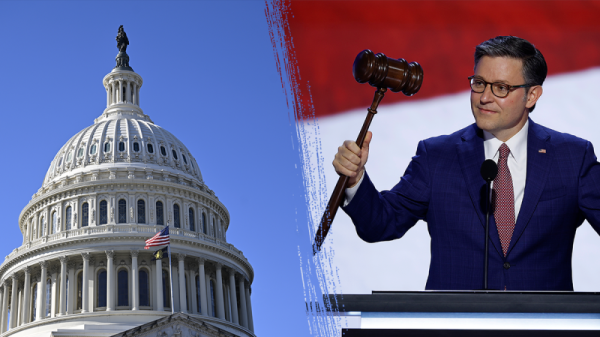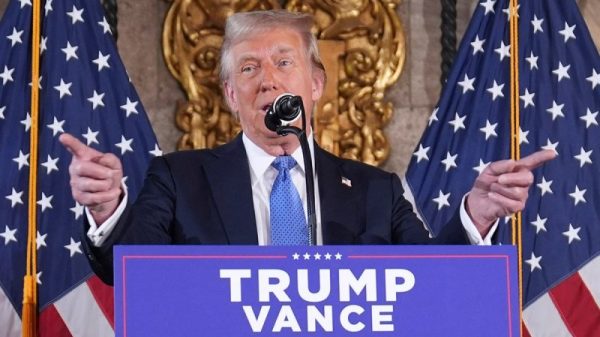April was a game-changer for the cannabis industry.
After deliberating for almost five months, the Drug Enforcement Administration moved to reschedule cannabis as lawmakers worked to combine the SAFER Banking Act with newly introduced stablecoin legislation.
Meanwhile, controversy struck as legal cannabis was seized in New Mexico, Canada’s Federal Budget 2024 was released with no mention of reform to high excise tax rates, and the saga of a once high-end cannabis dispensary finally ended in bankruptcy.
Keep reading to discover more about these industry-shaping events.
DEA finally moves to reschedule cannabis
Marijuana Moment reported on Tuesday (April 30) that Attorney General Merrick Garland had submitted to the White House Office of Management and Budget a proposal to reschedule cannabis from a Schedule I substance, the same category as heroin and methamphetamines, to a Schedule III one.
The Department of Health and Human Services suggested cannabis be reclassified on August 29, 2023, and the DEA has been deliberating on the decision for months, urged by lawmakers to heed the recommendation. President Biden has been vocal about his stance on this issue and has pressed the Attorney General to expedite the process, suggesting his readiness to move forward once the proposal reaches his desk.
While the most recent development is a promising step in the right direction, it’s worth noting that rescheduling could still take months. It will be subject to a public comment period before it can be sent to the Federal Register for publication, and Congress could still overturn the rule under the Congressional Review Act, which would send the matter to the Senate for a vote.
California’s MedMen files for bankruptcy
MedMen (CSE:MMEN,OTCQB:MMNFF), the first cannabis company in California to achieve a US$1 billion valuation, filed for bankruptcy in Canada on April 26. Its subsidiary company, based in Los Angeles, has been placed in receivership.
According to findings provided by multiple sources, the company, which has been struggling since 2020, is in roughly US$410.4 million of debt. Several poor decisions have been cited as the reason for its downfall, including opening a cannabis store on New York’s lavish Fifth Avenue before the state legalized cannabis. MedMen has also been hit with multiple lawsuits over the years, both from employees who accuse the company of violating labor laws and from investors who alleged excessive spending, stock price manipulation and bank fraud. The company had been selling off assets to try and make a profit since 2022.
In early 2024, the OTC marketplace designated MedMen’s securities to the Expert Market, thereby restricting its stock quote from public view. The marketplace cited failure to adhere to its reporting obligations as the reason for its decision.
Lawmakers come together over the SAFER Banking Act and stablecoin legislation
The SAFER Banking Act, which would prevent the federal government from taking action against banks and insurance companies doing business with legal cannabis companies, is garnering renewed support as lawmakers push for its potential inclusion in a broader package combining cannabis banking and stablecoin regulation.
Senate Banking Committee Chairman Sherrod Brown said on April 16 that he would be open to advancing stablecoin legislation if it is part of a package that includes the SAFER Banking Act, a measure that has won bipartisan approval in the Senate Banking Committee but has yet to receive full Senate approval. SAFER was passed by the Senate Banking Committee in a 14-9 vote on September 27 but has yet to be considered on the floor.
Lawmakers are reportedly hoping to attach a package that combines the SAFER Banking Act and a stablecoin bill to the reauthorization of the Federal Aviation Administration (FAA), which is scheduled to pass by May 10, although the plan has some opposition. The Lummis-Gillibrand Payment Stablecoin Act, which has gained bipartisan support, could be the most likely contender.
The plan has the support of House Financial Services Committee member Maxine Waters, who has been working with Committee Chairman Patrick McHenry to pass stablecoin legislation. She has also discussed the potential package deal with both Brown and Senate Majority Leader Chuck Schumer, a driving force behind the SAFER Banking Act. During an interview with Bloomberg, Waters said she was optimistic that stablecoin legislation would be passed soon, and that she was supportive of cannabis banking legislation as well.
Republican Representative French Hill also told Bloomberg he would vote in favor of tying cannabis banking to stablecoin legislation.
However, Senate Republican leader Mitch McConnell, who has blocked the SAFER Act in the past, has signaled he will continue to block cannabis banking legislation, and House Speaker Mike Johnson has said he opposes fast-tracking “unrelated measures” to such a critical piece of legislation as the FAA, according to sources for Bloomberg.
While this may mean it’s unlikely the package will go forward with the FAA legislation, Schumer is not giving up.
“There are lots of people who have different amendments not relevant to the FAA that want to get them on. I’m one of those—but we have to get this done in a bipartisan way. And we’ll figure out the best way to get it done,” he told Marijuana Moment.
If the bills fail to advance, the SAFER Banking Act could move forward as a standalone bill, with no date set to hold it to a vote, or lawmakers may try to attach it to another bill following the elections in November.
Kansas loses hope for medical cannabis bill
Despite legislative support from the Kansas State House and senators such as Rob Olson, a proposal to dislodge Senate Bill 135, also known as the Medical Cannabis Regulation Act, from the Senate Federal and State Affairs Committee and bring it to the Senate floor was unsuccessful on April 29.
The new motion to transfer the bill to the Senate came to a vote in the Republican-controlled Kansas state Senate, but it only received 12 out of the 24 votes it needed to move forward. The results of the vote ultimately killed the bill, leaving Kansas one of the few states that have yet to legalize medical cannabis despite years of attempts.
SB 135 would have allowed for the cultivation, processing, distribution, sale and use of medical cannabis for patients with qualifying conditions. Conditions named in the bill included Alzheimer’s disease, cancer, epilepsy or other seizure disorders, Parkinson’s disease, Tourette’s syndrome, fibromyalgia and “pain that is either chronic and severe or intractable.”
The bill had been tabled by Senate Republicans on March 17 of last year after two successful hearings.
No cannabis tax reforms in Canada’s federal budget
Canada’s government released its 2024 Federal Budget on April 16, and the contents disappointed hopeful cannabis operators across the country. Despite ongoing campaigns by Canadian operators calling for reform to the excise tax, the budget failed to address the issue, leaving the industry without the relief it has been seeking for years.
The current cannabis excise tax rate in Canada, which imposes C$1 per gram of cannabis or 10 percent of the producer’s selling price – whichever is higher – has significantly burdened the industry. High rates on sales over C$10 have impacted the profitability of the legal cannabis business, forcing operators to drive up the prices and driving consumers to the illicit market. This challenging financial environment has made it difficult for Canadian operators to expand, causing a stifled market with only a handful of major competitors.
For example, in August 2023, Tantalus Labs, a British Columbia-based company, was acquired by Atlantic Cultivation following insolvency. This came after the Canadian Revenue Agency (CRA) refused to renew Tantalus Labs’ tax license due to unpaid excise taxes amounting to C$4.3 million, part of a total C$14 million debt. Facing the CRA’s threat to destroy more than 1,200 kilograms of cannabis, Tantalus Labs conducted a court-approved fire sale of its remaining inventory to recover funds for creditors; however, it brought in only a fraction of what regular sales would have.
Despite recommendations from a government-appointed panel of experts to reconsider how excise tax rates are applied and a direct warning from Canada’s Tax Policy Branch to Canadian Finance Minister Chrystia Freeland that the excise tax was hurting Canadian companies, there was almost no mention of the cannabis industry in the 430 page budget document. The Federal government also increased eight cannabis regulatory fees on April 1.
Curaleaf acquires Northern Green Canada for US$16 million
Curaleaf Holdings (TSX:CURA,OTCQX:TSNDF), a major US-based cannabis operator that is publicly listed on the Toronto Stock Exchange, completed its acquisition of Canadian cannabis producer Northern Green Canada on April 23. Northern Green Canada is one of the few Canadian brands with a presence in Europe, having secured Good Manufacturing Practice certification (GMP) from the European Union in August 2022.
“This is an incredibly important deal for our international expansion strategy, as we’ll be able to bolster our supply of high-quality EU-GMP certified flowers immediately to key European markets as well as enter the fast-growing markets of Australia and New Zealand,” Boris Jordan, founder and executive chairman of Curaleaf, said in a press release.
According to the terms of the deal, which was announced in March, Curaleaf provided an initial payment of subordinate voting shares valued at US$16 million. An earnout is set to be paid in 2025 based on Northern Green Canada’s performance. Half of the earnout sum will be paid in cash and half in voting shares.
Cannabis seized in New Mexico
There have been six incidents of US Customs and Border Protection (CBP) officials intercepting state-regulated cannabis reported by licensed operators in New Mexico between February 14 and April 18, according to an article by MJBizDaily. State documents shared with the outlet show that the officials seized product amounting to at least 70 pounds of cannabis flower, concentrates, edibles, vape pens, cartridges and lab-bound samples.
The documents also show that the drivers had been detained for up to two and a half hours, that a K-9 unit was used on a vehicle transporting cannabis at least once and that one driver was told he would be placed under arrest and prosecuted by the DEA.
No similar incidents have been reported at other southern border crossings or in neighboring states.
In a letter sent to New Mexico Senator Mark Heinrich, managing partner of Las Cruces-based Head Space Distribution Kai Kirk said that product losses have amounted to almost US$300,000 and that seizures are threatening the “burgeoning cannabis industry and economic opportunity in New Mexico.” He also stated that in many cases drivers have had their fingerprints taken and during an arrest, the arresting officer failed to read the driver his Miranda rights.
New Mexico’s proximity to the southern border makes it a hotspot for border security and immigration enforcement, resulting in a larger presence of federal agents in the state. Federal agents, who are required to enforce federal drug laws, create challenges for local businesses that operate within state laws but are still in conflict with federal regulations. A CBP spokesperson told MJBizDaily that since cannabis is still a Schedule 1 substance, “any federal officer will take appropriate actions” if they encounter it during a search.
If the DEA cannabis rescheduling process is successful, it would likely alleviate the issues faced by New Mexico’s cannabis industry due to the conflicting state and federal laws. In the meantime, industry stakeholders like Kirk continue to advocate for a resolution that balances the enforcement of federal laws with the rights of legal cannabis operators in the state.
In his letter, which was co-signed by the Cannabis Chamber of Commerce and several dispensaries, delivery personnel and cultivators, Kirk requests that the border patrol policy be updated to reflect the state-legal nature of cannabis products and that either any product seized be returned or that operators be monetarily compensated.
Securities Disclosure: I, Meagen Seatter, hold no direct investment interest in any company mentioned in this article.







































